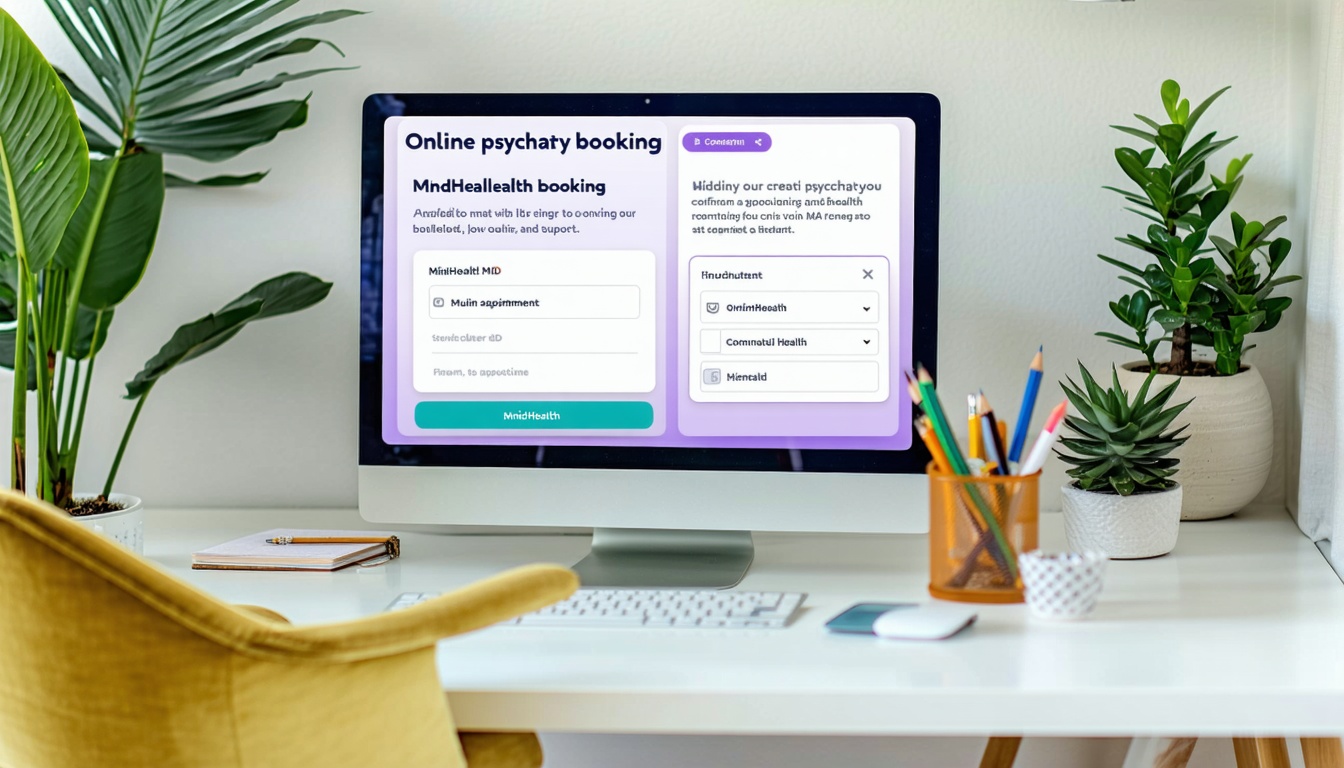When you or someone you love needs immediate mental health support, a same day psychiatric evaluation can feel like a lifeline. Instead of waiting weeks (or even months) for assessment and treatment, you’re able to see a mental health professional quickly, start addressing symptoms right away, and map out next steps for recovery. This can be especially reassuring if you’re wrestling with anxiety, depression, a crisis situation, or any intense emotional distress.
In this post, you’ll discover how same-day evaluations work, why they’re often crucial, and how MindHealth MD provides comprehensive telehealth psychiatric services—including medication assisted treatment (MAT) and transcranial magnetic stimulation (TMS) therapy. There’s no one-size-fits-all in mental health, so we’ll walk through who might benefit, what to expect, and how to get started, all in a warm, helpful way.
Understand a psychiatric evaluation
A psychiatric evaluation is essentially a deep dive into your mental and emotional well-being. Think of it as a thorough check-up for your mind. When you meet with a mental health professional, they explore areas like your symptoms, medical history, lifestyle, and any factors affecting your overall stability. According to Johns Hopkins Medicine [1], a comprehensive review can also include how your concerns impact everyday life, from work performance to family relationships.
Why it matters for mental health
A thorough evaluation sets the foundation for an accurate diagnosis. It’s your starting point toward finding the best treatments, whether that involves therapy, medication, TMS therapy, or other services. If you’re unsure whether you have depression or anxiety, for example, a thorough exam can clear up the confusion.
- You get a clear picture of your mental state.
- Doctors can uncover related medical or lifestyle factors faster.
- Planning treatment becomes more precise.
Common conditions addressed
When you sit down for an evaluation, you might wonder what issues your provider can help with. The short answer? Just about any mental or behavioral health concern, including:
- Anxiety, panic attacks, and phobias.
- Depression or persistent low moods.
- Bipolar disorder and other mood disorders.
- Post-traumatic stress disorder (PTSD).
- Obsessive-compulsive disorder (OCD).
- Substance use and co-occurring disorders.
- Psychotic symptoms or disorganized thinking.
Organizations like the Ohio State Wexner Medical Center [2] note that if left untreated, many of these conditions can escalate, especially during a crisis. That’s why same-day access to a psychiatric evaluation can be a game-changer.
Recognize the benefits of same-day care
Where traditional mental health systems might have lengthy waitlists, same-day psychiatric evaluations allow you to speak with a professional quickly. You can avoid watching your symptoms worsen while you mark days off the calendar, hoping there’s an earlier opening.
Faster diagnosis and treatment
Quick evaluation means faster insight into what’s really going on. As soon as you pinpoint potential issues, you can begin building a care strategy. Research from BlueSky Psychiatric Services [3] shows that immediate access to a preliminary diagnosis not only speeds up treatment, but can also ease the emotional burden that comes with prolonged uncertainty.
Preventing crises and emergencies
If you’re in distress—perhaps unable to cope with suicidal thoughts, severe panic, or intrusive fears—waiting can feel impossible. Same-day care has been shown to help individuals avoid emergency department visits or psychiatric hospitalization for issues that might be contained earlier. For example, the Ohio State Wexner Medical Center has Psychiatric Emergency Services (PES) available 24/7 to defuse crises, but a same-day evaluation can often keep you from needing a full-blown emergency visit.
Saving time with telepsychiatry
Connecting with a psychiatrist virtually is more convenient than commuting to a brick-and-mortar clinic. At MindHealth MD, you can schedule a telepsychiatry appointment once you’re ready for that same-day slot. Same-day telepsych options even allow you to hop on a video call rather than spend hours driving or juggling a busy schedule. That newfound flexibility can be pivotal if, say, you’re in the middle of a workweek or have child care responsibilities.
Explore essential services at MindHealth MD
At MindHealth MD, our goal is to help you or your loved one walk away with tangible mental health solutions. That’s why same-day psychiatric evaluations here are backed by a suite of proven services: telehealth psychiatry, medication assisted treatment (MAT) for addiction, and innovative TMS therapy for conditions like depression.
Telehealth psychiatry for immediate support
Telehealth psychiatry lets you meet with a licensed provider from the comfort of your home. Possibly you’ve been hesitating because you heard that virtual sessions feel impersonal, but you’ll often find the opposite to be true. Telehealth allows you to:
- Quickly schedule a mental health urgent appointment when you need it.
- Access care across state lines when traveling.
- Preserve privacy without sitting in a crowded waiting room.
One advantage of digital mental health support is how it works for people in rural areas or those with limited transportation. It can also help you seamlessly transition between therapy sessions, medication consults, or aftercare check-ins. By choosing a virtual psychiatry session, you reduce hurdles that sometimes keep individuals from seeing a provider at all.
Medication assisted treatment (MAT) for addiction
If substance use challenges are part of your mental health equation, medication assisted treatment might be a valuable approach. MAT combines prescribed medication with therapeutic support. This can reduce intense cravings, lessen withdrawal, and help you stay focused on recovery. It can be tailored for multiple substance dependencies, including:
Both options rely on evidence-based protocols, designed to balance your body’s dependence with the emotional underpinnings of addiction. By pairing MAT with counseling or group therapy, you end up addressing triggers on multiple fronts. You can also explore co occurring disorders treatment if conditions like depression or anxiety overlap with addiction.
Innovative TMS therapy for resistant depression
Transcranial magnetic stimulation (TMS) is a noninvasive treatment that uses magnetic fields to stimulate specific areas of the brain, often helping those with treatment-resistant depression. If you feel like you’ve tried several antidepressants or talk therapies with few results, TMS may be an option. At MindHealth MD, you can:
- Schedule TMS treatment when depression symptoms persist.
- Work with transcranial magnetic stimulation providers who specialize in this therapy.
- Get alternative solutions if standard medication approaches haven’t worked.
TMS requires multiple sessions, but each appointment typically lasts around 20 to 40 minutes. Many patients continue their daily routines without significant interruptions, noticing a reduction in symptoms over time.
Discover what to expect from a same day psychiatric evaluation
Once you connect with a professional—initially by phone or a quick online intake—you’ll set an appointment for later that day if openings are available. Here’s the usual breakdown:
Initial assessment
Your provider starts by reviewing your basic information, including symptoms, emotional triggers, and any urgent issues. They might ask about your sleep patterns, appetite changes, and potential stressors. For a thorough evaluation, they’ll also consider whether you have a history of psychiatric diagnoses or if you’re on any current medications. According to Synergy Mental Health & Wellness [4], it’s common to explore these details before moving into an in-depth discussion.
Developing a personalized plan
After your provider understands what you’re going through, you’ll talk about potential treatments. This could involve:
- Prescribing or adjusting medications.
- Scheduling therapy or counseling sessions.
- Recommending medication assisted treatment if substance use is involved.
- Suggesting a timeline for TMS if depression has been stubbornly resistant.
If your provider sees a need for immediate crisis interventions, they may direct you to call or text 988 or visit the nearest emergency department, depending on your mental state. But even in those heightened circumstances, the initial same-day evaluation helps ensure you’re receiving the right level of care.
Follow-up and ongoing care
Mental health care doesn’t end with the first appointment. For effective progress, you’ll typically schedule follow-ups, whether they’re weekly, bi-weekly, or monthly. Some patients benefit from additional services like an eeg diagnostic for mental health or comprehensive therapy programs. If you need more intensive support, you might check out partial hospitalization programs, intensive outpatient plans, or other structured care options referenced by facilities like OhioHealth [5].
Learn who might benefit from same-day appointments
Sometimes, you’re not sure if your concerns “qualify” for an urgent evaluation. In reality, it may be best to err on the side of caution to prevent severe drops in mood or crisis scenarios.
Individuals in acute distress
If you’re experiencing a mental health emergency—intense panic attacks, undue suicidal thoughts, or severe depression—seeking immediate help is critical. Waiting for the next available slot in a typical system could be detrimental, especially if your feelings intensify. Same-day services become a lifesaver for individuals who:
- Feel too overwhelmed to function at work or school.
- Fear harming themselves or others.
- Struggle with sudden psychotic symptoms.
By connecting to a psychiatric stabilization care service quickly, you minimize the risk of making life-altering decisions in a moment of hopelessness. Specialists like the Ohio State Wexner Medical Center [2] emphasize that prompt intervention often prevents crises from escalating.
Concerned family members or caregivers
If you’re supporting someone whose mental health is precarious, same-day evaluations can offer rapid insight and relieve some of your worry. A parent noticing increasing erratic behavior in a teenager, for instance, might see the advantage of immediate assessment. Likewise, if you’re caring for an older adult who’s displaying confusion, paranoia, or extreme mood swings, a quick evaluation can provide a clear next step. You might even arrange a child psychiatry immediate access or an adult psychiatry intake appointment so you’re not waiting for weeks to get professional insight.
Know how to schedule with MindHealth MD
Signing up for an evaluation is relatively straightforward. It’s also flexible for a variety of needs, from routine check-ins to urgent visits.
- Visit MindHealth MD’s website or call the clinic if you have questions.
- Review available appointment slots and confirm healthcare coverage or out-of-pocket payment details. If your insurance is an option, look for in network psychiatry care or insurance accepted psychiatry.
- Book your session. For urgent needs, you can often grab a same-day or next-day spot, such as a 48 hour psychiatry booking.
- Gather any medical records or list of medications.
- Log on to your telehealth session, or attend in person if you’re local and prefer face-to-face.
If cost is an issue, consider self pay psychiatry session options, or verify coverage before you confirm an appointment. The goal is ensuring you get care with minimal headaches or hoops to jump through.
Frequently asked questions
Below are five common questions people ask before scheduling a same-day psychiatric evaluation, along with straightforward answers.
-
How quickly can I get an appointment?
Appointments can often be made the same day you call, though availability varies by location and clinic. MindHealth MD offers immediate psychiatry appointment slots for individuals in crisis or needing prompt support. If schedules are tight, you may find openings within 24–48 hours. -
Is same-day psychiatric evaluation covered by insurance?
Coverage largely depends on your insurance provider. Many plans do include urgent mental health services, but you should verify details first. MindHealth MD has insurance accepted psychiatry options, so it’s worth double-checking if you’re covered for urgent evaluations. -
What happens if I’m in crisis?
If you’re considering harming yourself or someone else, or if reality feels overwhelmingly distorted, it’s best to call 911 or visit your nearest emergency department. You can also call or text 988, the Suicide and Crisis Lifeline, for immediate support. After crisis stabilization, you can follow up with MindHealth MD to arrange a psychiatric medication management plan or additional therapy. -
How do I know if telehealth works for me?
Many people find telehealth just as personal and beneficial as in-person care. You can do sessions wherever you feel comfortable, which can ease anxieties and help you open up. MindHealth MD’s virtual psychiatry session technology is HIPAA-compliant, ensuring your privacy. If you prefer in-person support, that’s also an option if it’s geographically feasible. -
What’s the difference between MAT and TMS therapy?
MAT stands for medication assisted treatment, often used for substance dependencies like mat for opioid addiction. It pairs specific medications with therapy or counseling to manage cravings and withdrawal symptoms. TMS stands for transcranial magnetic stimulation, a noninvasive procedure that targets specific brain areas to alleviate symptoms of depression when other treatments haven’t worked. It’s particularly beneficial for treatment resistant depression care.
Final thoughts on choosing MindHealth MD
Choosing a mental health provider is a deeply personal decision, but a same day psychiatric evaluation can remove some of the confusion and anxiety around that choice. By meeting with a qualified professional quickly, you’ll gain clarity around what’s going on and map out next steps. Instead of feeling stuck on waitlists, you or your loved one can start addressing concerns right now.
At MindHealth MD, we’re here to walk with you through every stage: from diagnosing conditions like PTSD or OCD, to launching ptsd psychiatric care or ocd treatment psychiatrist plans, to offering advanced therapies like TMS. You can also access helpful tools like an eeg brain mapping test to guide treatment planning, especially if you need more precise data.
Whatever your situation, taking that first step sooner rather than later offers a sense of relief and control. You’ll see that even a single, timely conversation with a mental health professional can ease your mind. Maybe it’s the start of a journey toward emotional balance, better coping strategies, or just a restored sense of hope.
You don’t have to navigate mental health challenges alone. Whether you’re coping with stressful life events, struggling with multiple substance use, or aiming for overall better emotional health, same-day evaluations can be your portal to care. A thorough evaluation today may save you from larger crises tomorrow. It can also serve as a catalyst for the healing and growth you truly deserve.
If you’re ready to move forward, you can book psychiatric appointment or look into a short term psychiatry session if you need brief but focused support. And if you find yourself needing more options—like in network tms providers, or a how to start mat program—those services are accessible, too.
Ultimately, it’s your mental health, and you’re worth investing in. A same-day visit is not just about speed. It’s about getting you (or a loved one) the help you need and breaking down frustrating barriers to care. If you’re still debating, ask yourself: would you rather wait to feel better, or start the process right now? Chances are, you already know the answer. The path to a more hopeful tomorrow could start today.








